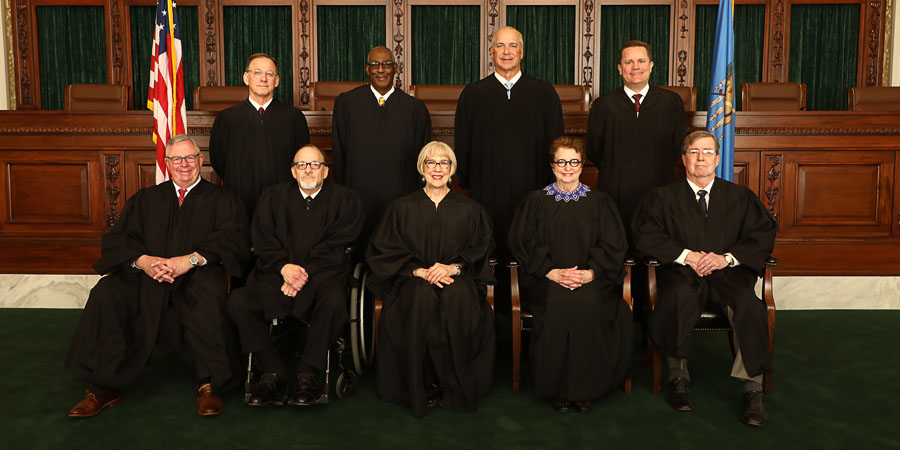The Oklahoma Supreme Court and Florida 3rd District Court docket of Appeals this thirty day period struck blows in favor of consumers and support suppliers relying on the principle of assignment of positive aspects.
1st, the Oklahoma Supreme Court on Dec. 15 reversed a lessen courtroom ruling keeping that a CSAA clause forbidding assignment of a policy also forbade assigning publish-loss declare payments.
The following day, Florida’s 3rd District held that Lloyd’s could not use an anti-assignment declaration for the duration of the plan software system as an exception to Florida’s ban on these limits in contracts.
The selections are good developments for collision repairers who depend upon the strategy of assignment of benefits, or AOB. A policyholder owed funds by an insurer can assign the ideal to collect that revenue to a 3rd-social gathering support company, these kinds of as a doctor, contractor or car entire body store. These 3rd functions assume the job of the purchaser and can sue the insurance company in an attempt to accumulate charges an insurance provider refused to reimburse.
However, the conditions also demonstrate how the AOB approach could possibly not generally carry on as effortlessly as the customer or service provider could feel.
The Florida scenario involved a claim from 2018, and the Oklahoma loss occurred in 2017. In equally instances, the policyholder’s insurance provider to begin with received judgments that their contracts forbade submit-decline assignments.
And the Florida situation notes that lawmakers in 2019 allowed insurers to provide homeowner’s insurance contracts which partly or completely ban the assignment of put up-loss rewards. This raises the chance of equivalent legislation remaining launched for auto coverage in Florida and other states.
Oklahoma
Both lawsuits involve homeowner’s statements. In Oklahoma’s Johnson v. CSAA Tokiko Johnson assigned her advantages to Triple Diamond Development, which believed her residence needed $36,346.06 in repairs just after a storm. CSAA only approximated $21,725.36 truly worth of injury, prompting the lawsuit. The litigation included each allegations of breach of agreement and bad religion.
The trial court docket did not rule on who was ideal. In its place, it just dismissed the situation as CSAA had requested on the grounds Johnson could not assign her declare to Triple Diamond.
“(CSAA) raised a person argument: Johnson’s plan and 36 O.S. § 3624 prohibit an assignment of the plan,” Oklahoma Justice James Edmonson wrote.
The Oklahoma statute holds: “Except as furnished in subsection D of Portion 6055 of this title, a policy might be assignable or not assignable, as supplied by its terms.” Edmonson described the CSAA coverage as just one that “requires insurer’s consent for assignment of the plan.”
CSAA argued that a claim also counted as section of a policy.
Having said that, Edmonson and 7 other justices dominated it didn’t and despatched the case again to the reduce court docket.

“An insured possessing an insurable desire may perhaps assign a write-up-reduction selected in action dependent upon a claim against a property insurance coverage plan without the need of violating an coverage plan clause necessitating written consent of the insurer for assignment of the policy,” Edmondson wrote.
Decide M. John Kane IV also agreed that article-decline promises could in truth be transferred in this circumstance, but he dissented on the majority’s choice to not bother ruling but on the strategy of assigning poor faith promises. “I would keep as a issue of legislation (undesirable faith) is not assignable,” he wrote.
Edmondson quoted his court’s 1957 final decision in American Alliance v. McCallie:
It appears to be to be the rule, followed by most courts, that where by these a coverage is in power and effect at the time the insured assets burns, by the happening of the latter function, the connection in between the insurance provider and the insured will become just that of debtor and creditor and that the chose in action, which the latter then has against the former, may well be validly transferred to a 3rd human being, by assignment, without having compliance with the policy’s requirement that the insurer’s consent thereto (by endorsement or if not) be received.
He said “chose in action” is a prevalent regulation time period that right now describes one thing with an assignable lawful appropriate.
Edmondson also shown how the U.S. Fifth Circuit Courtroom of Appeals backed the plan that the the vast majority of courts held post-decline assignments weren’t prohibited by limits on assigning a plan.
Though interpreting Texas law in 2010’s Keller Foundations v. Wausau Underwriters, the Firth Circuit wrote:
According to Couch on Insurance coverage, “the great vast majority of courts adhere to the rule that common stipulations in guidelines prohibiting assignments thereof except with the consent of the insurer use only to assignments just before loss, and do not protect against an assignment following loss.” These courts purpose that “[t]he purpose of a no assignment clause is to protect the insurance provider from enhanced legal responsibility, and immediately after occasions supplying rise to the insurer’s liability have transpired, the insurer’s hazard can’t be improved by a change in the insured’s id.”
(Ironically, the Fifth Circuit went on to observe that Texas was in the minority of states which didn’t follow this rule.)
“Courts adopting the the greater part placement have relied on a extended-recognized community coverage against restraints on assigning a chose in action, and they have mentioned this policy supersedes or outweighs a community coverage favoring contractual independence to produce these a restraint in a deal of insurance,” Edmondson wrote.

Edmonds and the vast majority also appeared to ridicule the concept that the Legislature meant the phrase “policy” to include assert proceeds.
“In summary, insurance provider contends the Legislature established a statutory indicating for ‘policy’ that was contrary to a ‘well-settled’ legal basic principle utilized by courts in other states construing coverage contracts for the then earlier 75 several years,” he wrote.
Edmonds pointed out that CSAA cited nothing supporting its wide definition and also undercut its personal situation by introducing ambiguity into the phrase:
No Oklahoma insurance statute or Oklahoma authority is cited by insurance provider for earning the expression “policy” to be broad adequate in scope to include Johnson’s assignment of a submit-decline selected in action. Insurance company details to no language in Johnson’s coverage defining the term “policy” as including an assignment of a chose in action. Insurance company argued an insured could not split a “policy” into lesser parts and then classify a piece as a “claim” for the function of an assignment, since a “policy” may perhaps not be assigned. Insurer equates the that means of “policy” with a “chose in action” when the latter is centered on a coverage-created obligation. Insurer’s argument injects ambiguity into the that means of the time period “policy” by arguing for a definition of “policy” not observed in (1) an insurance coverage statute, or (2) the historic and regular which means of the expression which distinguishes a “policy” and a “chose in motion,” or (3) a plan-described that means for “policy” in this charm. The language “assignment of this policy” in Johnson’s coverage is not ambiguous but insurer’s argument would generate an ambiguity and it would not ultimately assist insurer’s argument in opposition to an assignment due to the fact ambiguity would be settled in opposition to the insurer.
Florida
The Florida case associated home owners whom Lloyd’s argued negotiated absent their legal rights to assign put up-decline rewards.
Julio and Nora Lugones had a homeowner’s coverage with Lloyds at the time their household was broken in 2018. Soon after obtaining an assignment of proceeds, Extreme Crisis billed Lloyd’s the $18,458.39 the building corporation charged to fix the residence. The insurance company refused to shell out the declare, and Extraordinary Crisis sued for an alleged breach of agreement.
Lloyd’s argued that when the Lugoneses were being signing up for the policy, they agreed to an “Anti-Assignment Endorsement” which said:
In thing to consider of the top quality paid out, it is hereby agreed and comprehended that rights, benefits and obligations beneath the policy for which I am making use of may possibly not be assigned and/or transferred, both in advance of or right after a loss, devoid of the written consent of the corporation, except in the case of loss of life of an personal named insured.
The trial court docket agreed, issued summary judgment on Lloyd’s behalf, and denied an Severe Crisis motion for rehearing.
 This violated Florida legislation, in accordance to the 3rd Circuit Courtroom of Appeals.
This violated Florida legislation, in accordance to the 3rd Circuit Courtroom of Appeals.
“For more than a century, the law in Florida has been properly-settled: an insured require not attain the consent of the insurer prior to creating a post-loss assignment of its appropriate to payment of a declare beneath an insurance policies coverage, and any endeavor by an insurance company to prohibit the insured’s correct to do so is invalid,” Main Choose Kevin Emas wrote in the court’s 3- selection. Judges Alexander Bokor and Monica Gordo concurred.
“Applying a century of very well-founded Florida regulation to this 2017 deal of insurance policy, the anti-assignment provision was ineffective to avert or limit the insured from generating a write-up-decline assignment of the proper to payment of a declare without the need of the insurer’s consent, and the fact that the anti-assignment clause was put in the software, alternatively than the plan itself, is immaterial.”
Lloyd’s had experimented with to argue that this predicament was diverse — it and the Lugoneses had negotiated those agreement terms, according to Emas.
“In other words, Lloyd’s argues, this scenario is somehow special in that the insurance company did not unilaterally interpose this anti-assignment clause into the insurance policies policy instead, this was a agreement expression negotiated with the insureds and set forth in the application for insurance coverage, instead than in the insurance policies policy alone,” Emas wrote.
The court mentioned no. “After all, it is the insurance plan software and the insurance coverage plan which with each other represent the insurance coverage deal,” Emas wrote. (Emphasis Emas’.)
Emas also in the feeling mentioned that the century of Florida regulation forbidding anti-claims-assignment clauses came to an conclusion in 2019.
The Florida Legislature passed Florida Statute 627.7153 for procedures produced or renewed efficient July 1, 2019. The law states insurers can limit submit-reduction added benefits so prolonged as they market a policy with no limitations and cost reduce tiers of rates for the guidelines with partial or full constraints.
The policy and kind speaking about the arrangement to surrender assignment legal rights must warn the policyholder of its contents utilizing 18-issue kind.
Images:
The 2020 Supreme Courtroom of Oklahoma is revealed. (Furnished by Oklahoma Supreme Court)
A picture illustration of Oklahoma legislation. (Baris-Ozer/iStock)
Florida 3rd District Court docket of Appeals Chief Choose Kevin Emas is shown. (Delivered by 3rd District)
Share This:

